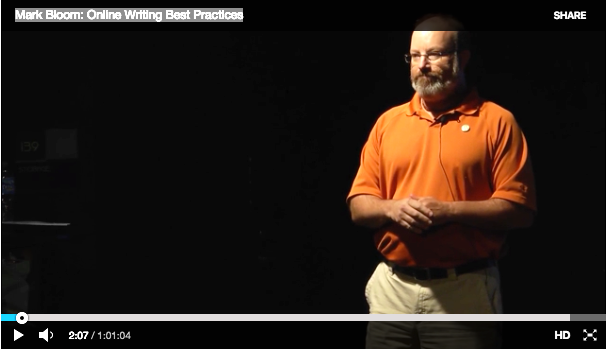by Elle Ray | Jun 20, 2016 | Writing
Hire a Writer Who’ll Write in Clear Language

Ever come upon websites that are difficult to read? It’s frustrating. Even though they seem to match your search terms exactly — whether it’s “how to write with authority,” “how to hire a writer for website content” or something else — you can’t find the answers you need. Either the copy is too dense and hard to scan or the relevant information isn’t easy to pick out.
So, if you’re like us, you’ll click “Back” rather than trying to muddle through a website page that requires work to find anything. Colorful graphics are nice and sliding photos engage your attention for a minute, but after that, it’s information you’re after, not entertainment. Again, if you’re like us, you’re busy; you want answers and you want them now.
Website Mistakes to Avoid
Bad writing and bad formatting often go hand-in-hand. Sometimes, websites lean more in one direction than the other, but either problem by itself is enough to obfuscate the information visitors are seeking. Some of the worst offenses that are emphatically not user-friendly include:
- Large blocks of text with little or no white space — give readers some room to breathe
- Four- or five-syllable words that you have to look up — as Steven Krug wrote: “Don’t make me think!”
- Misspellings or gobbledygook that doesn’t make sense — they undermine readers’ trust
- Incorrect word usage — it’s frustrating if the meaning isn’t clear
- Keywords that do not relate to the topic — don’t waste readers’ time
- Links that don’t work (especially “Read More…”) — double-check all links before you publish
- Long sentences — people read differently online; make it easy for them
- Taking too long to get to the point — unless your website is a magazine, write to inform
It’s this last annoyance that drives us to get right to the point in this blog post. Because we respect our readers and we want to deliver value in our blog.
How to Write for People
Too many times, clients hire a writer to create “marketing-speak” that pays little respect to readers. When you hire a writer at Ray Access, we insist on writing for people — your audience and your customers — not search engines or ad agencies. We’ve dedicated our blog to advise those of you who can’t or don’t yet want to hire a writer right now. Maybe you’ll hire us later, when you get so busy that you can’t find the time.
 To that end, listed below are several writing tips you’ll find useful when you’re struggling with writing your website content. This is “good as gold” advice:
To that end, listed below are several writing tips you’ll find useful when you’re struggling with writing your website content. This is “good as gold” advice:
- Picture your ideal client as you write
- Imagine she’s standing right in front of you
- Write like you talk
- Leave out, or fully explain, industry lingo that your ideal client wouldn’t understand
- Write in short sentences — one thought for each sentence
- Keep paragraphs short, no longer then three or four sentences each
- Break up the text with subheadings, making your content easier to scan
- Make your margins wide; reading across large screens is hard on the eyes and neck
- Spellcheck, spellcheck, spellcheck
- Get another pair of eyes on your writing before you publish it
- Re-read your work at least once before sending it to an editor (like Ray Access)
You Can’t Be Too Simple
You won’t insult your readers if you make your copy clear, simple, concise and to-the-point. It’s not about dumbing down your copy; it’s about clearing up your message. Unless you’re publishing a white paper for an institutional trade organization or academia, give your readers a break.
You prove nothing when you learn how to write with big words and long sentences. You prove nothing when you try to sound intelligent — except that you aren’t. Don’t hire a writer who is condescending and doesn’t listen to you. If he tells you he can write it better than you can say it, run. You know your business, and you know what you want to tell your prospective customers about your business.
Now you know better how to write website content. But you can always contact Ray Access to hire professional writers and editors.
Ray Access is a content marketing firm that delivers targeted words to empower your business. Contact us about your specific project to receive a quote or discuss your needs. We write website copy, blog posts, e-newsletters and more. Everything we do is thoroughly researched, professionally edited and guaranteed original.
by Mark Bloom | Jun 13, 2016 | Small Business Advice
Keeping Up When Everything Keeps Changing
WordCamp Asheville Lessons and Takeaways
WordCamp is a weekend conference held in different cities around the globe. All the conferences focus on educating people how to use WordPress — an open-source foundation for building websites. At the same time, each one is organically produced by local people. WordCamp Asheville took place last weekend (June 4–5, 2016), and 2016 WordCamp lessons came in many forms.

A still from the video from Mark’s presentation at WordCamp Asheville in 2015. Watch the video.
Mark spoke at the conference with a well-received presentation titled “You’ve Written Your Blog; Now What?” But the conference provided many opportunities to learn beyond the scheduled sessions. There were networking events, corridor conversations and a “Happiness Bar,” in which WordPress experts of all stripes made themselves available for one-on-one assistance.
WordCamp for Writers?
At Ray Access, we’re writers, not website developers. And while we built our website, rayaccess.com, with WordPress, we had a little help from our friends. In fact, our website is still in a process of evolution. But all websites are never really done. Even now, there are tweaks and content added almost every week.
Because the sessions formed four tracks, including one for all users and another for business people, we didn’t need to be a developer to get valuable tips and advice at the conference. The 2016 WordCamp lessons included:
- How to connect your WordPress website to social media
- How to integrate email marketing into your website
- Where to go for your keyword research
- How to use analytics
- Why Facebook is the gorilla in the room when you talk about social media
- How to drive traffic to your WordPress website
- How Google ranks your website
Particularly Valuable 2016 WordCamp Lessons
 If you want to know what we, the writers at Ray Access, consider the most important thing we learned at WordCamp Asheville, then you’re about to be rewarded for reading this far. It doesn’t matter if you use WordPress or not; if you have a website and you blog, this information will help you.
If you want to know what we, the writers at Ray Access, consider the most important thing we learned at WordCamp Asheville, then you’re about to be rewarded for reading this far. It doesn’t matter if you use WordPress or not; if you have a website and you blog, this information will help you.
Here’s the most effective way to blog. It’s not the easiest or the most efficient, but if you really want to drive traffic to your website, then you must follow this five-step process. It’s so cool, w’ll probably write more about it in the future. In the meantime, though, here is a trade secret.
5 Steps to Blog Effectively
These steps come from Leah Quintal of JB Media Group:
- Brainstorm your topic. Discover the questions that people — and your potential customers — are asking and address those topics.
- Do your keyword research. Find the keyword phrases that get high volume but have low competition.
- Find out if others have filled that niche. Use the chosen keyword in a Google search.
- Write your content. Finally! Don’t write your blog post until you do steps 1–3.
- Promote your blog post. You’re not done until you’ve put your words where your audience can find them.
Information from these 2016 WordCamp lessons will change the way we blog in the future. We hope they’ll help you too.
Ray Access is a content marketing firm that delivers targeted words to empower your business. Contact us about your specific project to receive a quote or discuss your needs. We write website copy, blog posts, e-newsletters and more. Everything we do is thoroughly researched, professionally edited and guaranteed original.
by Elle Ray | Dec 15, 2015 | Writing
Learn How to Write Online Content Like a Pro
Earn Your Readers’ Trust & They’ll Come Back
More and more people, especially those under 30, prefer not to touch paper. Instead, they do all their reading online and through an electronic device. But read they do.

And the better the writing, the more they will read. Writing for online audiences just takes a little forethought and consideration, very much like authors have been doing for ages.
Whether you are preparing to write your first ebook, an online post for your business or an article for an online magazine, follow these 10 online writing tips from your friends at Ray Access to engage your audience:
- Make the page scannable. Consider how the page looks. Add subheadings, bulleted lists, numbered lists, bolded phrases and white space to make it easier for online readers to scan.
- Keep sentences and paragraphs short. Clear, concise sentences and tight, small blocks of print are much easier to digest on a screen. Writing for online audiences requires clarity and brevity to the max.
- Understand your readers and what they’re looking for. Don’t try to pack each post with too much unrelated information. It’s better (for readers and search engines) to create multiple articles and post them on different days. You’ll keep your readers engaged at the same time too.
- Create and stick with your personal tone. If your readers expect witty prose or gut-busting gags, don’t disappoint them with a dry entreaty. On the other hand, if you’re known for your serious and informative writing for online posts, stick with what readers expect.
- Give your readers the main idea of the article right up front. Write for online readers just like a journalist using the inverted pyramid. The who, what, where, why and when should be clear right from the start.
- When you repurpose information you’ve found on other sites, rewrite it so that you don’t use more than three words in a row from the original to avoid plagiarism dings. And if you’re quoting hard copy info, break it up so that it’s easier to digest for online readers.
- Writing for online search engines means you should create clear headlines and subheads. The headers are not the place for your witticisms. You can put them in later in the copy. Headlines must be clear and tight to get picked up and understood by both search engines and online readers.
- Add links to references so that readers can see the original source easily. If your writing is tight, informative and easy-to-read, they will come back.
- Use an active voice. Be commanding when writing for online audiences. If you take a stand, then say so. Make your points with conviction. And never start a sentence with “I think.”
- Let another pair of eyes review your writing before you hit Send or Publish. Good writing always is the result of good editing. That’s true for both printed and electronic words.
Now that you know some of the secrets of online writing, go share your message to the world! And if you need ideas, want some writing help or even need editing services, contact us for expert writing services.
Ray Access is a content marketing firm that delivers targeted words to empower your business. Contact us about your specific project to receive a quote or discuss your needs. We write website copy, blog posts, e-newsletters and more. Everything we do is thoroughly researched, professionally edited and guaranteed original.
by Mark Bloom | Feb 22, 2014 | Content Marketing
Personas Help You Write to a Specific Target
Whenever you write anything, the most important questions to ask yourself, before you begin, is:
Who am I writing this for? Who am I trying to reach?”

Regardless what you are writing, whether it’s a blog post, a brochure, a script, or even an email, you must answer these questions before you start typing. Your answers will determine:
- The language you use
- The approach you take
- The tone of your writing
Without the answers, you’ll likely miss your mark and not connect with your target audience. You’ll be wasting your time.
Imagining Your Audience
That’s where a persona can be useful. A persona is an imagined conglomerate of what your audience might look like. It takes some research, but ultimately, creating a persona can help you target your business communications more effectively: marketing, advertising, websites, etc. Its return on investment, if you think in those terms, is astronomical.
Here’s a primer on how to create a persona (or a series of personas) for your company.
Creating a Persona
After you’ve done your research, you should have a pretty good idea of the people you need to target for your business. In other words, you should know the demographic you’re marketing to. It might be women aged 45–60. It might teenagers in affluent neighborhoods. It might be avid bicycle riders.
The trick to creating a persona is to personify your target demographic into one or two imaginary people — people with names, characteristics, jobs, families, hobbies, and possessions. Provide as much detail as possible. What are the names of the person’s children? What is he/she making for dinner tonight? No detail is too insignificant. Include a photo or drawing of that person.
If your target market is wide enough, create a second, complimentary persona. Make sure this second persona is distinct enough from the first to be useful, even if they share certain attributes such as their income brackets.
 For example, Pete is a 35-year-old computer scientist who sits in a chair all week. He keeps in shape by riding his bicycle on weekends. He earns $52,000 a year, has two young children, Joseph and Shelby, and a dog named Hank. He loves his bike and spends time cleaning the tires and tightening the gears after each ride. He belongs to a cycling club that organizes regular group rides. They also do fundraisers for local charities.
For example, Pete is a 35-year-old computer scientist who sits in a chair all week. He keeps in shape by riding his bicycle on weekends. He earns $52,000 a year, has two young children, Joseph and Shelby, and a dog named Hank. He loves his bike and spends time cleaning the tires and tightening the gears after each ride. He belongs to a cycling club that organizes regular group rides. They also do fundraisers for local charities.
Employing Your Persona
When you’ve finished your persona, print it out or copy it onto large sheets of paper. Put it up on the wall. This is the person or these are the people you’re writing to. These are the human beings you’re trying to reach. Respect them. Respect their time. Offer them value. Get their attention.
Determine what they need before you start writing. What is it that you have that would interest them? Why indeed should they buy your product or service? If you can find persuasive arguments to sell to your personas, you’ll have persuasive arguments for the people they represent out there in the real world.
At Ray Access, we believe in doing the research for finding the market you’re trying to reach. We don’t start writing until we know who we’re writing for. You should do the same.
Ray Access is a content marketing firm that delivers targeted words to empower your business. Contact us about your specific project to receive a quote or discuss your needs. We write website copy, blog posts, e-newsletters and more. Everything we do is thoroughly researched, professionally edited and guaranteed original.

 To that end, listed below are several writing tips you’ll find useful when you’re struggling with writing your website content. This is “good as gold” advice:
To that end, listed below are several writing tips you’ll find useful when you’re struggling with writing your website content. This is “good as gold” advice:

 If you want to know what we, the writers at Ray Access, consider the most important thing we learned at WordCamp Asheville, then you’re about to be rewarded for reading this far. It doesn’t matter if you use WordPress or not; if you have a website and you blog, this information will help you.
If you want to know what we, the writers at Ray Access, consider the most important thing we learned at WordCamp Asheville, then you’re about to be rewarded for reading this far. It doesn’t matter if you use WordPress or not; if you have a website and you blog, this information will help you.

 For example, Pete is a 35-year-old computer scientist who sits in a chair all week. He keeps in shape by riding his bicycle on weekends. He earns $52,000 a year, has two young children, Joseph and Shelby, and a dog named Hank. He loves his bike and spends time cleaning the tires and tightening the gears after each ride. He belongs to a cycling club that organizes regular group rides. They also do fundraisers for local charities.
For example, Pete is a 35-year-old computer scientist who sits in a chair all week. He keeps in shape by riding his bicycle on weekends. He earns $52,000 a year, has two young children, Joseph and Shelby, and a dog named Hank. He loves his bike and spends time cleaning the tires and tightening the gears after each ride. He belongs to a cycling club that organizes regular group rides. They also do fundraisers for local charities.